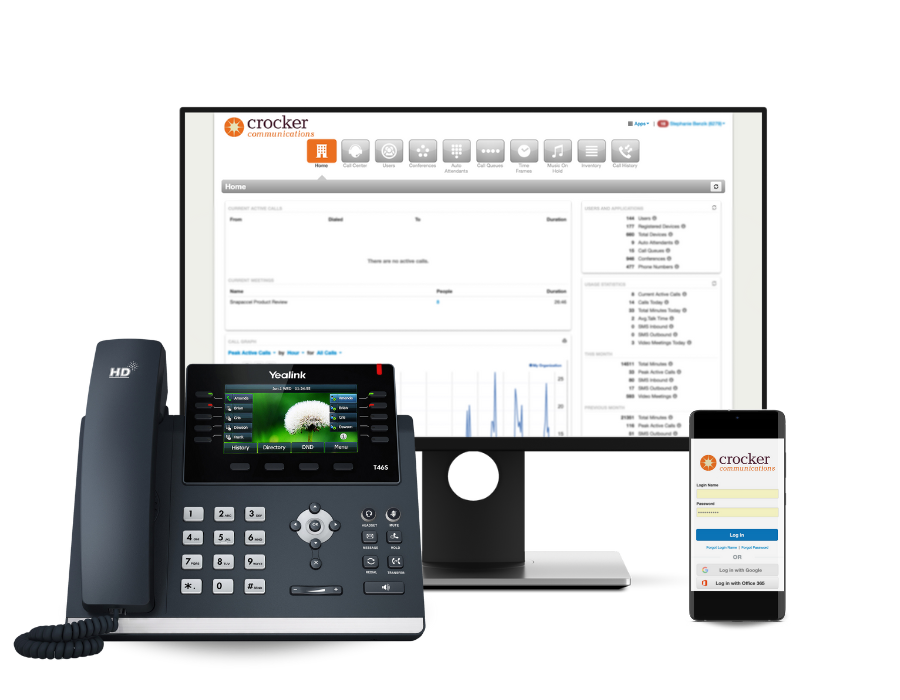The future of office communications will consist of upgraded office phone systems. Why? Because the future of work requires a next level of flexibility that wasn’t as common before 2020 changed the world as we knew it. While remote work has always existed, it has become an integral part of our workforce, alongside hybrid work as the preferred work modality. As of 2023, 12.7 percent of full-time employees work from home, while 28.2 percent work a hybrid model.
Beyond shifting how businesses communicate internally, a modern business phone system can also improve customer experience and how your business interacts with its customers, which ends in improved business operations. So, how have office phone systems become the future of office communications? Let’s explore.
Office Phone Systems and The Changing Work Environment
Over 82 percent of workers cited flexible or hybrid work arrangements as important to job satisfaction. The benefits of remote/hybrid work environments are undeniable, and it’s clear that these modalities are both the present and the future of our workforce. With the right office phone system in place, you can offer your team a successful remote/hybrid experience, but before we move on to that, let’s explore how these modalities have shifted work environments.
The Rise of Remote Work
How we work has significantly transformed with the rapid rise of remote work. This shift, largely accelerated by global events, has redefined how we approach office communications. We now need ways to stay connected and collaborate without being physically present with our peers. Remote work has also made it necessary to have tools that can work globally as businesses expand their talent pools to find employees worldwide.
Benefits and Challenges: Remote work brings many benefits, including increased flexibility, reduced commuting stress, and access to a wider talent pool. However, it also presents challenges such as potential communication gaps, feelings of isolation, and the need for effective tools to ensure seamless collaboration.
The Emergence of Hybrid Work
Hybrid work arrangements are quickly becoming just as popular in the modern workplace as remote work was a few years ago. These setups combine in-office and remote work, offering employees greater flexibility and choice, while employers feel like they can create connections between their teams just like before.
Catering to Both Worlds: The rise in hybrid work expectations creates a necessity for communication solutions catering to employees in the office and working remotely. Ensuring that everyone remains connected and productive is important as teams become more dispersed. In the upcoming sections, we’ll explore how modern office phone systems play a pivotal role in bridging the gap in team communications.
The Employee Experience (EX)
Let’s face it, the satisfaction of employees is vital to a successful business. The employee experience isn’t something you should ignore. Did you know that a great modern office phone system can improve the employee experience?
Modern office phone systems are built to foster improved collaboration among employees. With features like conference calling, video meetings, and instant messaging, these systems facilitate real-time communication regardless of physical boundaries. This connectivity enables teams to share ideas and make decisions efficiently without needing to meet in person.
Examples of Better EX: Consider a sales team across different time zones. A modern phone system allows them to hold regular video conferences, brainstorm ideas, and coordinate their efforts whenever needed. This improves sales performance and creates a more engaging and collaborative work environment, leading to better employee experience.
Flexibility and Mobility
Modern phone systems offer employees the flexibility to work from virtually anywhere. With mobile apps and softphone capabilities, team members can stay connected while on the go. This flexibility empowers employees to choose their work environments- the office, home, a coffee shop, or a client’s site.
Furthermore, employees need the ability to attend meetings, respond to client inquiries, and collaborate with colleagues regardless of location. Modern phone systems equip them with the tools to do just that, ensuring that work can happen whenever and wherever it’s most productive. This not only boosts efficiency but also accommodates your workforce’s diverse needs and preferences.
The Customer Experience (CX)
Upgraded phone systems can transform the way you do customer service. Around the globe, 96 percent of consumers say customer service is an important factor in their choice of loyalty to a brand. These phone systems provide businesses with the tools and capabilities to offer their clients more efficient and responsive support.
Benefiting CX with Advanced Features
Modern office phone systems come loaded with advanced features designed to benefit the customer experience. These features include:
- Call Routing and Virtual Receptionists: Call routing ensures that customers are directed to the appropriate department or agent, reducing wait times and addressing their inquiries swiftly. Virtual receptionists, on the other hand, provide a professional and efficient initial point of contact, enhancing customers’ overall impression of your business.
- AI-Driven Analytics: AI-driven analytics tools integrated into phone systems can analyze customer interactions, providing insights into their preferences and needs. This data can be used to personalize services, recommend products, and optimize customer support processes. The result is a more tailored and satisfying experience that can lead to increased customer loyalty and retention.
Embrace the Future of Communication Now
Stay ahead in the ever-evolving world of office communications. Future-proof your business by upgrading your phone system today. Contact Crocker Communications, your trusted communication partner, and discover the perfect phone system solution tailored to your needs.

